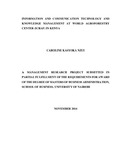| dc.description.abstract | The recent past has seen a growing interest in knowledge management and use of
Information and Communication Technologies (ICT). In the process of creating,
accumulating and disseminating knowledge, Information and Communication
Technologies (ICT) plays a very important part. The objective of the study was to
determine the role ICT has played in enhancing knowledge management at ICRAF and
challenges the organization faces in knowledge management. The study employed
descriptive survey design in which primary data was collected using questionnaires. The
collected data was analyzed using SPSS. Using primary data collected from 125 employees
at the headquarters in Nairobi Kenya, the researcher found that more than three quarters of
ICRAF staff understood what knowledge management is and that they are aware that the
processes of capturing, cataloguing, storing and sharing on information are paramount to
preserving institutional memory. There was a prevalence of use of ICT in managing
knowledge with more than half of the knowledge in the organization originating from ICT
based sources and a similar portion of information and knowledge in the organization
stored in ICT based systems. The study established that ICT has a major influence on
knowledge management practices in the organization with systems being well integrated
and information found to be up to date and trusted. The research identified poor
organization structure, poor organization incentives in staff compensation and recognition,
inadequate organizational learning, insufficient staff training and awareness and poor time
management as major challenges to knowledge management at ICRAF. The study
recommends that training staff on IT systems and introducing incentives to organization
learning will contribute towards the success of knowledge management in the institution.
The study also recommends that introducing a networked organization structure will
improve communication among staff and improve trust. Integration of ICT in each of the
knowledge management processes will foster and sustain knowledge management in the
organization in the long run. | en_US |

